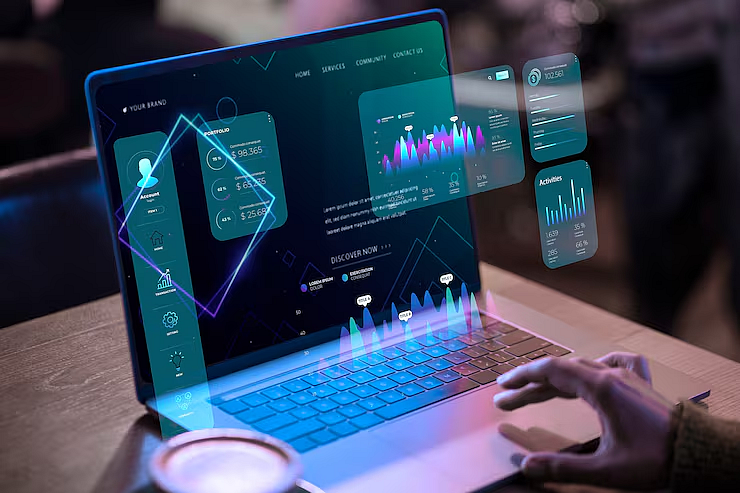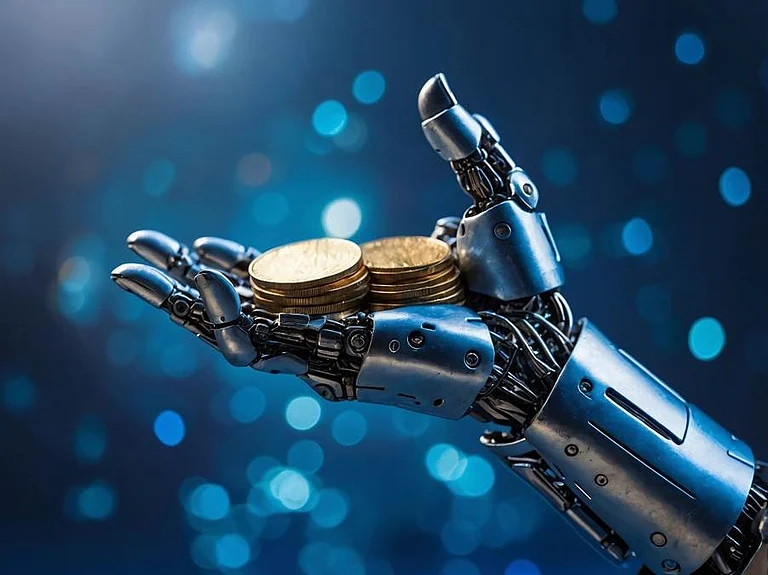The development of blockchain technology has done more than bring forth digital currencies; it has brought a new whole digital economy into existence. Decentralized applications (dApps) and smart contracts are at the heart of that revolution, two technologies that push blockchain beyond a payment platform. For every individual constructing a crypto portfolio, knowing about such tools is essential as they determine how the cryptocurrencies behave in real-life situations, how trust comes into play without the involvement of intermediaries, and how the digital ecosystems expand.
Understanding Smart Contracts in Simple Terms
A smart contract is a computer program that is coded and resides on a blockchain that automatically enforces the terms of the agreement when specific conditions are met. In contrast to conventional agreements that involve lawyers, brokers, or other middlemen, smart contracts are code-based and exist in digital form.
For instance, if you wish to purchase a digital good in return for cryptocurrency, rather than it being done through an intermediary, the smart contract will take over automatically transferring ownership once your payment has been confirmed on the blockchain. All of this saves time, lowers costs, and provides clarity to everyone involved.
To investors who are constructing their cryptocurrency portfolio, smart contracts play an important role since they establish trustless spaces. This implies that users won't need to trust central parties or intermediaries, thus lowering the risk of fraud and manipulation.
What Makes Decentralized Applications (dApps) Different
Whereas smart contracts are the foundation, decentralized applications (dApps) are, in fact, the applications that users directly use every day. dApps are computer programs developed on blockchains that employ smart contracts in a bid to provide services. As opposed to apps managed by a single company or server, dApps operate on decentralized networks, therefore censorship-resistant, always-on, or single-party-influenced.
Some examples of dApps are lending platforms, decentralized exchanges (DEXs), gaming universes, and even social media platforms. These utilize smart contracts to enable interactions between users, money transfers, and governance. By presenting services without centralized authority, dApps offer users greater transparency and authority over their online existence.
This is most beneficial when one is diversifying a crypto portfolio. The possession of tokens supporting strong dApp ecosystems, such as Ethereum, Solana, or Polygon, provides exposure to broader blockchain utilities rather than speculative trading alone.
The Role of Smart Contracts and dApps
Smart contracts and dApps are very interdependent. Smart contracts give the ruleset that operates automatically, and dApps offer the user-friendly interface that bridges humans to blockchain services. Lending in decentralized finance (DeFi) is an example where smart contracts are utilized to lock collateral, determine interest rates, and execute repayments without a go-between. Humans engage with these services through a dApp interface that renders it hassle-free.
In this regard, the ghostly engine may be used to describe smart contracts, and the dApps would be the carriages transporting people to their destinations. Both are necessary to have if blockchain is to evolve past being utilized as a value storage and transfer tool.
For individuals looking to invest for the long term, realizing this synergy is important. A diversified portfolio of cryptocurrencies is favored when it has exposure to smart contract and dApps-enabled projects because their success will drive adoption and value on the underlying token.
Advantages and Challenges of Smart Contracts
The advantages of smart contracts are self-evident. They streamline things by eliminating middlemen, decrease costs, and ensure everything is equitable through automation. Transactions are also secure because once a smart contract has been placed on the blockchain, it cannot be altered without consent. This immutability instills faith in a system that would otherwise have no faith.
But there are downsides. The fact that code is immutable means that errors in smart contracts come with a cost. Hackers take advantage of them for their own gain, causing huge financial losses in the world of blockchain. Smart contracts also presuppose correct external information, and the act of inputting this information securely—via systems known as oracles—is still an issue.
Investors who commit their cryptocurrency portfolio to investing in smart contract-enabled projects need to be cognizant of these risks. The security, transparency, and auditing importance of projects should be as paramount as research into their growth opportunities.
Why Are dApps Important for Mass Adoption
Blockchain will not become mainstream until it has real-world, everyday applications, and dApps offer just that. They bring blockchain to users in a concrete, usable manner. Whether borrowing a loan without having to visit the bank, selling art digitally with NFTs, or gaming where assets are actually valuable, dApps make blockchain a reality.
dApps also create communities where the governance is decentralization. The holders of the tokens vote on updates or decisions, thus they are more engaged and not passive consumers. Engaged participation builds loyalty and survivability in the long term.
Investment-wise, dApps realize the potential of what is held in a crypto portfolio. Rather than holding coins such as Bitcoin or Ethereum, investors can diversify into tokens driving some dApp ecosystems, e.g., DeFi platforms, metaverse projects, or decentralized games.
The Future of Smart Contracts and dApps
In the future, dApps and smart contracts will develop in a number of different directions. Scalability using technologies such as layer-2 solutions, sharding, and cross-chain interoperability will enable dApps to support millions of users in an optimal manner. Smart contracts will also become sophisticated, with the ability to carry complex logic to mimic traditional financial products or legal frameworks.
To that, governments and companies are testing blockchain-based applications increasingly. From supply chain tracking to digital identity projects, smart contracts and dApps may transform non-financial industries.
To those creating a long-term crypto portfolio, this future is full of boundless promise. Investment in scalability, security, and interoperable ecosystems may handsomely reward them as adoption goes mainstream.
Conclusion
Decentralized applications and smart contracts are not any longer niche ideas; they are the core of the future of blockchain. Smart contracts make trust and efficiency automatic, and dApps bring blockchain into people's daily lives with practical applications. Their combination makes ecosystems secure, transparent, and decentralized.
For novice and seasoned investors alike, knowledge of these advancements is not only beneficial but sensible. As the blockchain universe expands, establishing a portfolio of cryptos that leverages the efficiency of smart contracts and dApps may be the difference between trend chasing in the dark and being an active participant in the online world.





















